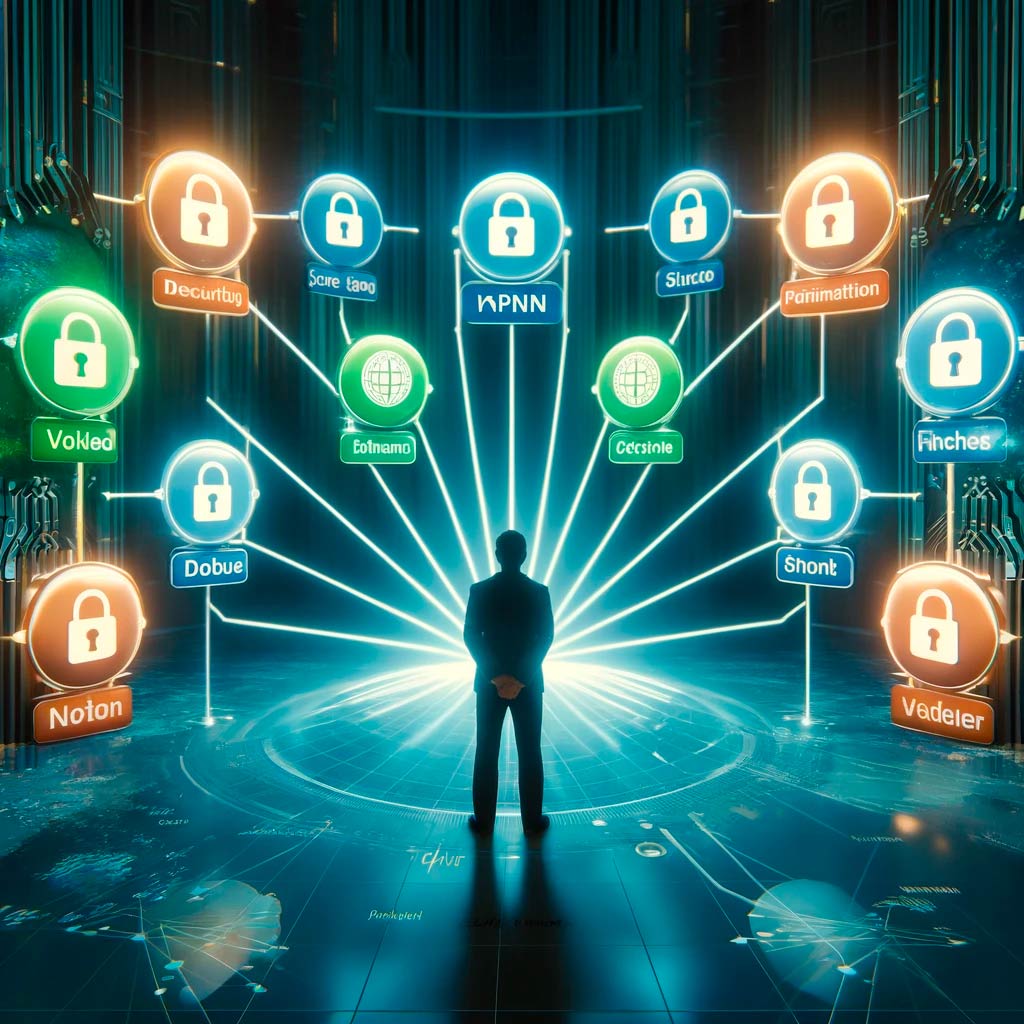Содержание
Freelancers often work with confidential data, exchange important information with clients, and connect to the internet via public Wi-Fi networks. All of this makes them vulnerable to cyber threats. A VPN (Virtual Private Network) can be a reliable solution for data protection and ensuring privacy. In this article, we will discuss why a VPN is a critical tool for freelancers.
What is a VPN?
A VPN (Virtual Private Network) is a technology that creates a secure and encrypted connection between your device and the internet. Here are the main functions of a VPN:
- Data Encryption: Protects information from interception.
- Changing IP Address: Hides your real location.
- Access to Blocked Resources: Bypasses geographical restrictions.

Why Do Freelancers Need a VPN?
Freelancers face many unique challenges and threats online. Using a VPN can significantly improve their security and convenience. Here are a few key reasons why a VPN is an essential tool for freelancers:
Enhanced Security When Working with Clients
Freelancers often transfer and receive confidential data, whether it’s financial information, personal client details, or trade secrets. Without protection, this data can be intercepted by malicious actors. A VPN ensures that all transmitted data is encrypted, making it inaccessible to third parties. This is especially important when using public Wi-Fi networks, which often lack sufficient protection.
Protection of Confidential Data
A VPN helps maintain the confidentiality of your work. When using a VPN, your real IP address is hidden, and instead, the IP address of the VPN server is used. This prevents tracking of your location and online activity. Anonymity is critical for protecting personal information and preventing targeted attacks on your devices.
Avoiding Geographical Restrictions
Freelancers often work with clients from different countries and regions. Some websites and online services may be blocked or restricted based on geographic location. A VPN allows you to bypass these restrictions, providing access to necessary resources regardless of your physical location. This is especially useful for accessing international platforms, educational resources, or tools that may be unavailable in your country.
Advantages for International Cooperation
Freelancers frequently work with international clients and participate in projects requiring access to resources only available in certain regions. A VPN ensures seamless access to such resources, allowing you to effectively collaborate with clients and partners worldwide. Additionally, using a VPN can reduce latency and improve connection quality, which is important when working with large files or conducting video conferences.
Ensuring Stable Connectivity
Freelancers often work in various conditions, including public places with unreliable Wi-Fi networks. A VPN helps stabilize the internet connection, protecting it from disruptions and attacks. This is particularly important for those working in coworking spaces, cafes, or other locations with open internet access.
A VPN becomes an integral part of a freelancer’s toolkit, providing data protection, privacy, and access to necessary resources. Regardless of where you work and with whom you collaborate, a VPN helps make your work safe and efficient.
Main Threats to Freelancers Online
Freelancers are exposed to numerous cyber threats due to the nature of their work, which includes frequent internet connections from different locations and exchanging confidential data with clients. Let’s review the main threats freelancers face and how to prevent them.
Phishing and Fraud
Phishing is a method of social engineering used by attackers to deceive users into disclosing confidential information such as passwords and credit card details. Phishing attacks can be carried out through emails, social media messages, or fake websites. Freelancers may become victims of phishing while interacting with clients or using unreliable work platforms.
Examples of threats:
- Fake emails purportedly from well-known services asking to update credentials.
- Fake websites mimicking popular freelance platforms to steal login details.
Protection Recommendations:
- Always check URLs before entering data.
- Use two-factor authentication to secure accounts.
- Be cautious with emails from unknown senders and avoid opening attachments without verification.
Data Leaks and Hacks
Freelancers often handle sensitive information, including client personal data and trade secrets. Without proper protection, this data can be stolen by hackers, leading to serious consequences for you and your clients.
Examples of threats:
- Account hacks on freelance platforms or cloud storage services.
- Data leaks through unsecured connections.
Protection Recommendations:
- Use complex and unique passwords for each account.
- Regularly update software and security systems.
- Encrypt important data and store it in secure cloud services.
Unsecured Wi-Fi Networks
Connecting to public Wi-Fi networks without proper protection can lead to data interception by malicious actors. Such networks are often used in cafes, coworking spaces, and other public places where freelancers prefer to work.
Examples of threats:
- Man-in-the-Middle (MITM) attacks, where an attacker intercepts the connection between the user and the internet.
- Fake Wi-Fi networks set up to steal user data.
Protection Recommendations:
- Use a VPN to encrypt internet traffic when connecting to public Wi-Fi networks.
- Avoid using public Wi-Fi networks for transmitting confidential information.
- Check networks before connecting and use only reliable and verified access points.
Ransomware
Ransomware is malicious software that encrypts files on the victim’s computer and demands a ransom for unlocking them. Freelancers can become victims of such attacks when downloading files or visiting infected websites.
Examples of threats:
- Infected email attachments.
- Downloading files from unreliable sources.
Protection Recommendations:
- Regularly back up data.
- Use antivirus software and regularly scan the system for threats.
- Be cautious when downloading files from the internet and avoid suspicious links.
Using a VPN and other security measures can help freelancers protect themselves from these threats and ensure safe and productive work online.
Benefits of Using a VPN for Freelancers
Using a VPN offers numerous benefits for freelancers, from data protection to improved performance. Here are the key advantages that make a VPN an essential tool for remote work:
Security and Data Encryption
One of the main advantages of using a VPN is security. A VPN ensures that all data transmitted between your device and the VPN server is encrypted. This means that any data you send or receive will be protected from interception by malicious actors.
- Data Encryption: Protects your information from unauthorized access. Even if data is intercepted, it remains encrypted and useless to hackers.
- Protection When Handling Confidential Information: Freelancers often handle sensitive client data. Using a VPN ensures that this data remains protected and confidential.
Anonymity and Privacy
A VPN helps maintain anonymity online by hiding your real IP address and replacing it with the IP address of the VPN server. This makes you less vulnerable to tracking and surveillance.
- Hiding Real IP Address: Your online activities cannot be linked to your real location.
- Anonymous Browsing: Protection from tracking by advertisers and other third parties who may collect data on your internet behavior.
Access to Blocked Resources
A VPN allows you to bypass geographical restrictions, providing access to resources and websites that may be blocked in your region. This is especially useful for freelancers working with international clients or using resources restricted by geographic location.
- Bypassing Geographical Restrictions: Access to content and services unavailable in your country.
- Working with International Clients: Ability to collaborate with clients worldwide without restrictions.
Improved Performance and Stability
Some VPN services offer performance enhancements, providing a more stable and faster connection. This is particularly important for freelancers working with large files or using video conferencing.
- Reduced Latency: Some VPN services are optimized for fast connections, which can reduce latency and improve the quality of video calls and online work.
- Stable Connection: A VPN can ensure a more stable internet connection, which is important when working in public places or during frequent connection interruptions.
Protection When Using Public Wi-Fi Networks
Public Wi-Fi networks, such as those used in cafes or coworking spaces, are often insecure and can become targets for malicious actors. A VPN protects your connection, ensuring the security and confidentiality of your data.
- Secure Connection: Protection against Man-in-the-Middle attacks and other threats when using public networks.
- Encrypted Traffic: Your data remains protected even when connecting to unsecured networks.
Cost Savings and Access to Offers
Some online services and stores offer different prices depending on your location. Using a VPN allows you to access better prices and deals by changing your virtual location.
- Savings on Subscriptions and Purchases: Ability to take advantage of better offers and discounts available in other regions.
- Access to Content: Ability to watch movies, TV shows, and use other services that may be restricted by geographic location.
In summary, a VPN provides freelancers with reliable data protection, anonymity, access to necessary resources, and stable connectivity, making it an indispensable tool for effective and secure work online.
How to Choose a VPN for a Freelancer?
Choosing a VPN service for a freelancer is an important step that can significantly impact security and productivity. Here are the key criteria to help you make the right choice.
- Security and Encryption
One of the main factors when choosing a VPN is the level of security and encryption it provides.
- Encryption Types: Look for VPN services that use advanced encryption methods, such as AES-256. This level of encryption is a standard for protecting data and is used even by government agencies.
- Security Protocols: Protocols such as OpenVPN, IKEv2, and WireGuard are considered reliable and provide a high level of protection.
Tip: Pay attention to additional security features such as DNS leak protection, Kill Switch (automatic disconnection from the internet if the VPN connection is lost), and two-factor authentication.
- Connection Speed
Freelancers often work with large files or participate in video conferences, so VPN connection speed plays a crucial role.
- Server Locations: The more servers a VPN service offers, the higher the chance you can find a server that provides high speed. It’s better to choose a VPN with servers located geographically closer to you.
- Speed Test: Many VPN services offer trial periods or money-back guarantees, allowing you to test speed and performance before committing.
Tip: Choose a VPN with good reviews regarding speed and performance, and verify if they offer a free trial or money-back guarantee.
- Server Network Coverage
A large network of servers provides more options for connection and access to resources from different regions.
- Geographic Coverage: The wider the VPN’s server network, the more options you have for accessing content and services available in different countries.
- Special Servers: Some VPN services offer servers optimized for streaming, torrenting, or other specific needs.
Tip: Choose a VPN with servers in the regions where you often work or where your clients are located.
- Ease of Use and Interface
The VPN application should be easy to use and navigate.
- User Interface: A user-friendly interface simplifies setup and connection management. Look for VPNs with intuitive apps for different devices and platforms.
- Customer Support: Reliable customer support can help resolve issues quickly if they arise.
Tip: Test the VPN application during the trial period to ensure it meets your requirements and is easy to use.
- Privacy Policy
Check the VPN provider’s privacy policy to ensure they do not collect or store your personal data.
- No-Logs Policy: Look for VPNs that adhere to a strict no-logs policy, meaning they do not store records of your online activities.
- Third-Party Audits: Some VPNs undergo independent audits to confirm their no-logs claims.
Tip: Read reviews and research the VPN provider’s reputation regarding privacy and data protection.
- Price and Subscription Plans
Consider the cost of the VPN and the availability of subscription plans that suit your needs.
- Pricing Structure: Compare prices and check for discounts or special offers. Some VPNs offer lower rates for long-term subscriptions.
- Money-Back Guarantee: Look for VPNs that offer a money-back guarantee, allowing you to test the service and ensure it meets your expectations.
Tip: Evaluate the cost relative to the features and benefits provided to ensure you get good value for your money.
Examples of VPN Services for Freelancers
Here are a few popular VPN services that may be especially useful for freelancers:

-
NordVPN
- Advantages:
- High Security: Uses AES-256 encryption and OpenVPN and WireGuard protocols.
- Large Server Network: Over 5000 servers in 60+ countries, ensuring excellent speed and access to international resources.
- No-Logs Policy: Does not keep user activity logs.
- Additional Features: Built-in Kill Switch, DNS leak protection, and Double VPN (MultiHop) option.
- Advantages:
-
ExpressVPN
- Advantages:
- High Speed: Known for its fast speeds and stable connection.
- Encryption and Protocols: Uses AES-256 and OpenVPN, IKEv2, and Lightway protocols.
- Wide Coverage: Over 3000 servers in 90 countries.
- No-Logs Policy: Does not store user data.
- Additional Features: DNS leak protection and built-in Kill Switch.
- Advantages:
-
CyberGhost
- Advantages:
- User-Friendly Interface: Simple and intuitive app.
- Large Server Network: Over 7400 servers in 90 countries.
- Encryption and Protocols: AES-256 and OpenVPN, IKEv2 protocols.
- No-Logs Policy: Does not keep activity logs.
- Additional Features: Built-in ad blocker and protection from malicious sites.
- Advantages:
-
Surfshark
- Advantages:
- Unlimited Devices: Can be used on an unlimited number of devices simultaneously.
- Large Server Network: Over 3200 servers in 100 countries.
- Encryption and Protocols: AES-256 and OpenVPN, WireGuard protocols.
- No-Logs Policy: Does not keep activity logs.
- Additional Features: CleanWeb (ad blocker), MultiHop, and Camouflage Mode.
- Advantages:




Комментарии к статье